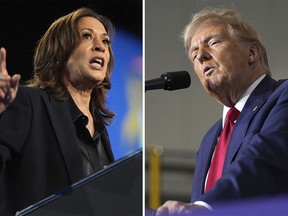Exactly as we surmised from internal evidence when we suspended VDARE, it turns the Biden Regime WAS behind debanking of political oppenents, which in our case meant denial of payment processors. “Government documents unsealed at the end of 2020 proved that the federal government used its regulatory authority over financial markets to attack political opponents.” — Peter Brimelow
How Democrats ‘debanked’ political opponents in shocking attack on American freedoms
By
Published Dec. 6, 2024, 3:23 p.m. ET

President Biden has overseen nearly four years of a two-tiered justice system, as his pardoning of Hunter Biden and the political persecutions of then-candidate Donald Trump make all too clear.
But there have been quieter attacks on justice, like “debanking” — and few people realize they could be the next victims because they are a “politically exposed person,” that is someone who disagrees with the liberal status quo.
Debanking is a kind of financial blackballing that has appeared within just the last 20 years.
It started under then-President Barack Obama as a war to punish those seen as political enemies, like firearm manufacturers. Government documents unsealed at the end of 2020 proved that the federal government used its regulatory authority over financial markets to attack political opponents.
Government regulators essentially make it impossible for certain people or businesses to make online transactions, or to have a bank account or a credit card.
Dr. Joseph Mercola, a critic of the COVID vaccine, found his business accounts shut down by JP Morgan Chase, a move his chief financial officer claimed was at the same time Mercola spoke out against the Food and Drug Administration.
Biden admin brought unprecedented climate change prosecution against man for ‘smuggling greenhouse gases’ by transporting refrigerants
In her new memoir, Melania Trump says her bank account was terminated after the riots of Jan. 6, 2021, and her son Barron was unable to open his own account. She called it “political discrimination.”
In the modern world, exclusion from electronic financial services is an economic death sentence.
Regulators will claim that they’re not technically forbidding a private bank from doing business with an individual, and that the bank is freely choosing not to have that person as a customer.
But the reality is very different — because of the undue influence and control in the hands of today’s bloated administrative state.
A bureaucrat can make someone’s life so difficult that the victim is forced to comply — the government strong-arming a private individual or institution into doing what the government itself cannot do by law.
It’s like when the Biden administration pressured social-media companies into deplatforming anyone who questioned political talking points about the COVID pandemic.
The debanking scourge under President Biden has hit the crypto world particularly hard. The Securities and Exchange Commission has unleashed a plague of investigations, some real and some merely threatened, to force innovators and investors out of that space.
Dozens of tech and crypto founders have been debanked under Biden, and their inventions smothered.
On Joe Rogan‘s podcast, venture capitalist Marc Andreessen blamed the Consumer Financial Protection Bureau, a group set up at the behest of Sen. Elizabeth Warren (D-Mass.) to go after crypto firms in particular.
“Basically every crypto founder, every crypto startup, either got debanked personally and forced out of the industry, or their company got debanked,” Andreessen said.
Andreessen added that others, like Kanye West, have been debanked, “For having the wrong politics. For saying unacceptable things. Under current banking regulations, after all the reforms of the last 20 years, there’s now a category called a politically exposed person, PEP. And if you are a PEP, you are required by financial regulators to kick them off, to kick them out of your bank.”
President-elect Donald Trump’s nominee for Treasury Secretary, Scott Bessent, has pointed out that many Democrats have been on an anti-crypto crusade as they attempt to wash off the stink of FTX and Sam Bankman Fried — the crypto scammer and fraud who gave massive campaign donations to Democratic politicians.
The problem goes far beyond crypto or the tech industry, however. And it’s bigger than just the Biden administration, which uses surrogates like the Southern Poverty Law Center to fallaciously label any conservative institution a “hate group.” Doing business with a group that engages in “hate” can get a financial institution dinged by regulators for increased “reputational risk.”
What do you think? Post a comment.
What does that have to do with a creditor’s ability to repay a loan or the solvency of a bank or the worth of an individual’s assets? Nothing. The radical left’s push to debank anyone with whom they disagree has nothing to do with sound financial principles — it’s all politics.
Anyone who appreciates freedom and the rule of law should be supremely grateful that the incoming president has put the bureaucrats on notice: Their days of covertly forcing political compliance are numbered.
E.J. Antoni, a public-finance economist, is the Richard F. Aster fellow at the Heritage Foundation.

